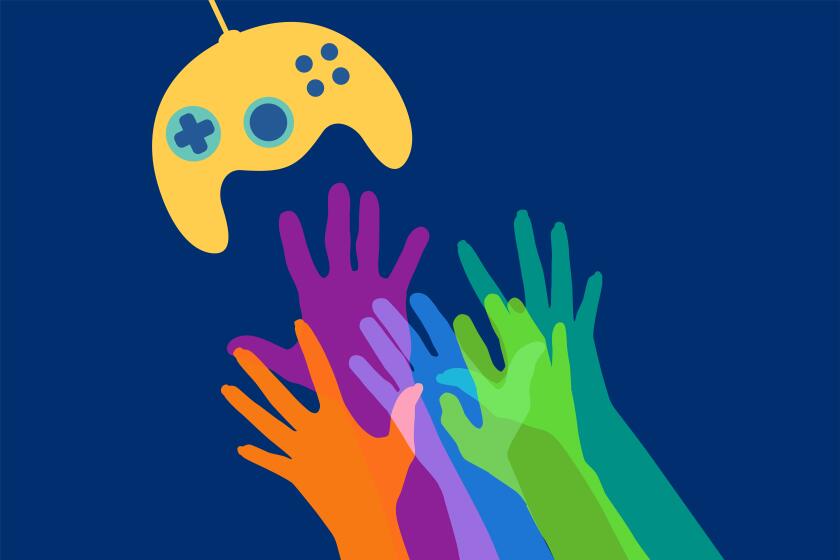This heartbreaking video game about the joys of life deeply resonates in 2020
“Before I Forget” is the reminder I didn’t know I needed.
Be forewarned: This is a game with moments of sadness. “Before I Forget” left me in tears in the middle of a weekend afternoon. At times, its 60-minute interactive text can even be frightening — though emotionally scary, not in the horror sense.
Still, while there is the terror of an illness at its core, “Before I Forget” is primarily a love letter to living life to the best of one’s abilities, of finding a place for career and relationships and of even mastering the art of forgiveness, toward others but most especially ourselves.
It also delivers a message for these stressful times: Be kind to yourself.
I was nervous to play “Before I Forget.” I was afraid it would be too painful, that this work of growing old, of suffering from a form of dementia, would be too difficult to stomach in the midst of a pandemic. That it would remind me of the uncle I lost to Alzheimer’s.
I realize I’m not alone in my trepidation. Knowing what “Before I Forget” is about might prevent many from playing. That would be a shame.
For myself, I’m thankful that I didn’t let the game’s themes scare me away.
“Before I Forget” resonates beyond any attempt to capture an illness. While the game never lets us forget the heartbreak that is living through dementia, this is ultimately a game about remembering the joys of life.
We play as Sunita (Anjali Kunapaneni), an esteemed woman suffering through early onset dementia. “Before I Forget” unfolds as a mystery, encouraging both Sunita and the player to pause and reflect on one’s life. There are brief moments in which the game disorients us, reflecting Sunita’s inability to know the way around her own home.
The indie game, envisioned by the two-person development team of Chella Ramanan and Claire Morwood, is designed to be bittersweet. Yet playing at a time in which I feel I am losing months of my life to a pandemic that has me hunkered down in a small apartment, I found that it snapped me out of a weekend malaise. As we discover the highs of Sunita’s science career and her romance with musician Dylan (Mason Scott Robinson), “Before I Forget” seemed to be telling me that just because 2020 appears to have put many aspects of our lives on hold, I should remember to continue to do the things that I enjoy.
Allegations of sexual, emotional and professional abuse reveal the game industry’s struggles to mature. Ubisoft resignations are only part of the fallout.
“Sunita is a person who has lived a life and is not just a person with a disease,” says Ramanan. “We don’t want to look at her and pity her and be left with that. Like, ‘Isn’t it terrible what happened to her?’”
Instead, the game wants us to walk away with a bit of an uplift, even as we discover some of the tragedies that befell Sunita. “‘Didn’t she have an amazing life and a great career?’” Ramanan says to capture some of the ideas she and Morwood want players to take from the game. “‘I wish I could have someone who loved me as much as Dylan.’”
With a first-person perspective we traverse a home shared by Dylan and Sunita. Sunita’s thoughts narrate the action as we come upon career mementos or notes that remind us what day it is, what pills to take and what groceries to stop buying. We pick up old postcards or records and sometimes view vignettes from the past that are triggered by the items. We find messages that appear to be written by Dylan, and hear his elegant piano refrains as we move, the music appearing like a character that’s trying to nudge a memory to the forefront of our minds.
There’s also a tenseness. A challenge was finding the balance between the bright, slightly abstract look of the game and the emotional terror Sunita sometimes suffers.
“I think it would have been quite easy to make it into more of a horror game, which is something we wanted to stay away from,” Morwood says. “There are a couple of horror bits, but it’s not a horror game. We tried really hard to avoid that with the color palettes and the music and the slow pace of the game. While you know that she has dementia, you’re focusing on her life outside of that.”
And yet we’re never not aware that Sunita is trapped in her home. Her closet is outfitted with old newspapers that tell of Dylan’s career. Their placement may have once been the work of a proud spouse but now underscore the fragility of the thoughts of our past. There is a panicked moment where Sunita imagines a hole in her hallway and can’t remember where the home’s bathroom is, but the real horror is the realization of how much slips from our minds, even when we are healthy.
Keita Takahashi, known for ‘Katamari Damacy,’ took six years to make his new game ‘Wattam.’ How child’s play and diverse Vancouver inspired him.
Though it was never intended as such — Ramanan and Morwood created the initial version of “Before I Forget” for a 2016 game jam event in the U.K. city of Bristol — the game feels decidedly relevant today. Now, for instance, as our nation struggles to corral the coronavirus, it’s not uncommon to encounter someone who brushes off the pandemic by telling those who are fearful to simply stay home.
And yet in “Before I Forget” we constantly sense the walls closing in on us, making it clear that such advice is not really tenable. I related to the game not because I had a relative suffer from a form of dementia, but because I haven’t left my apartment in four months. Isolation, and the mind tricks it causes, can be its own form of sickness.
“I never thought of it in terms of people resonating with it in a different way because they have actually experienced that isolation,” says Ramanan, noting we typically associate dementia “with elderly people or sick people or people who are disabled and might not be able to get out as much as they want to or are suffering from mental health issues. That was always the experience of the ‘other’ before, but maybe people can relate to it a bit more now — that loneliness.”
It’s key to the game’s appeal.
Often when we discuss games that deal with serious topics, it’s done with the belief that there must be some educational goal, to put us in the mind of another person to create empathy and teach us to understand someone else’s point of view. But that’s not necessarily the intent of “Before I Forget.”
“I’m totally confused by the people who always leveled that assumption at us, that games are somehow too frivolous to tell serious stories, and if they’re doing something serious they must then become a functional tool,” Ramanan says. “That’s a weird disconnect that I don’t understand. I don’t think any other medium has that problem. If you have a film with a person with dementia, you don’t assume it’s to go into schools and care homes to teach about dementia. That sounds ridiculous.”
In fact, neither Ramanan nor Morwood have been close with anyone suffering from dementia. They simply wanted to tell a story that feels like a character study, one that uses a tragedy to celebrate life.
"Before I Forget"
More to Read
The biggest entertainment stories
Get our big stories about Hollywood, film, television, music, arts, culture and more right in your inbox as soon as they publish.
You may occasionally receive promotional content from the Los Angeles Times.












